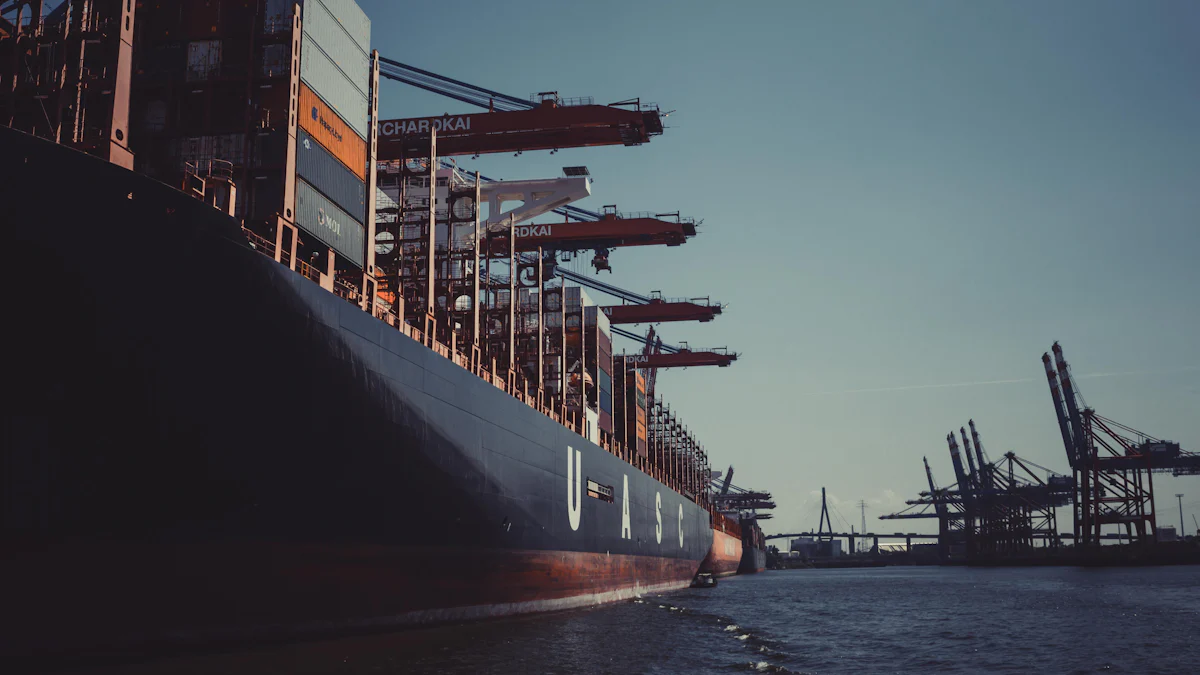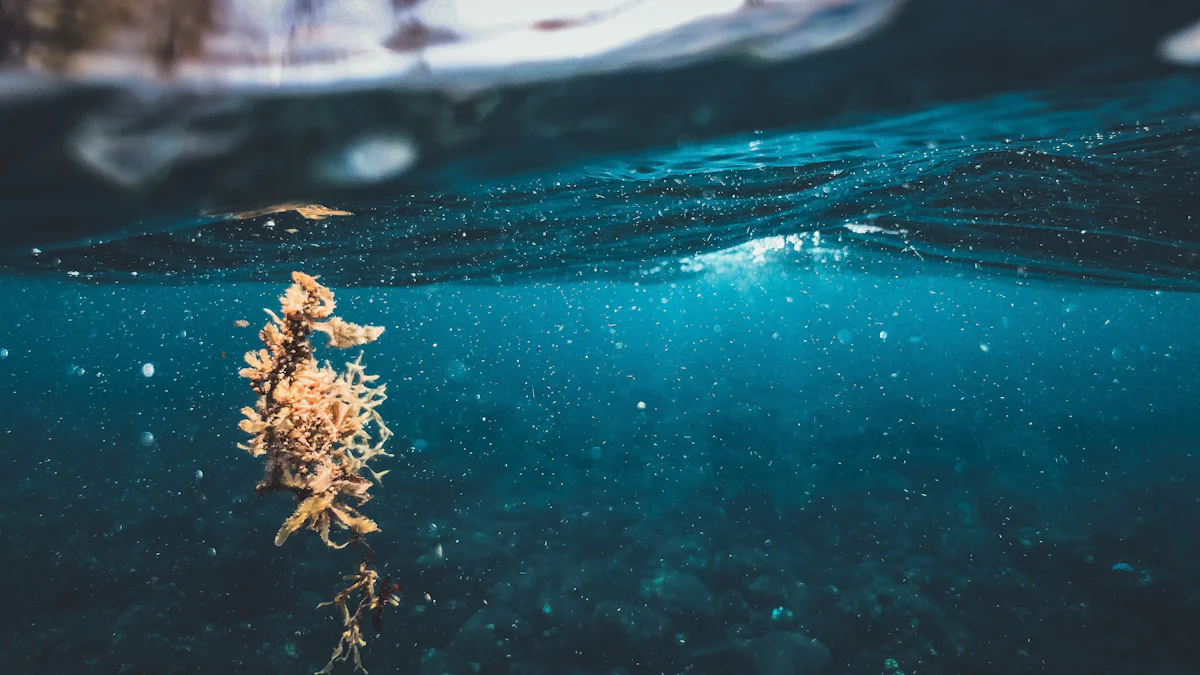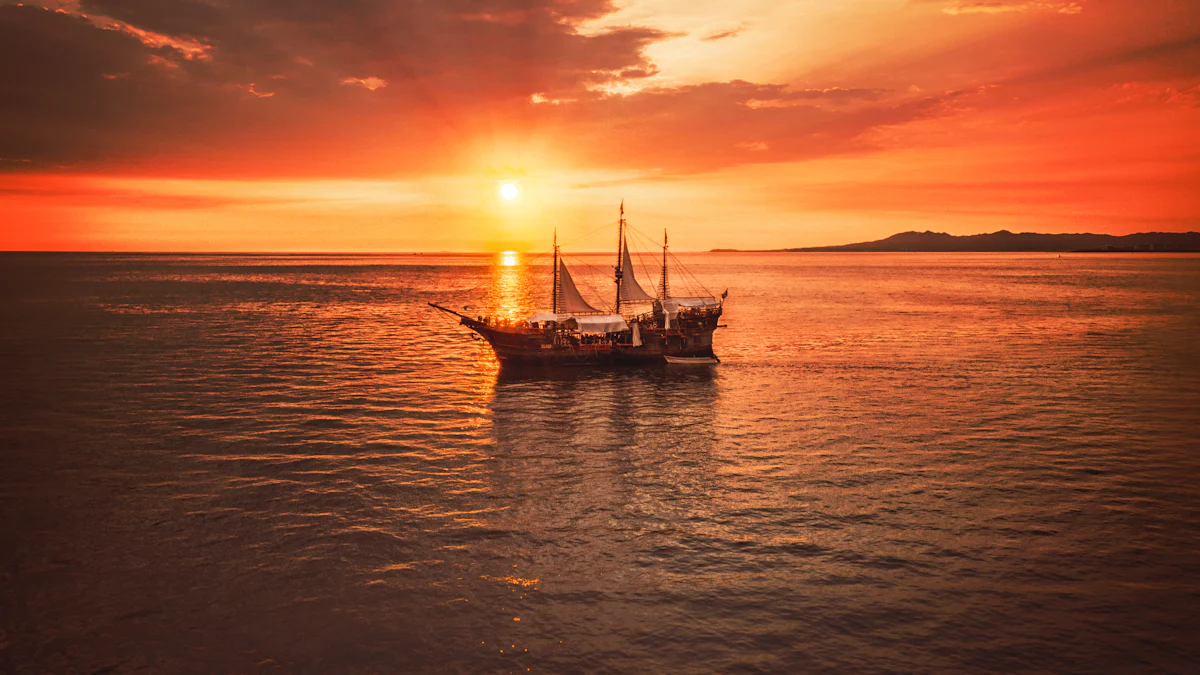Introduction to Maritime Law

Maritime Law, commonly known as admiralty law, governs the intricate realm of navigation and shipping. It is essential to global trade, with over 80% of international goods transported by sea. This legal framework ensures seamless operations across the high seas, tackling issues such as freedom of navigation and piracy suppression.
Historically, Maritime Law has evolved from ancient codes to contemporary conventions, adapting to the constantly changing maritime landscape. As you delve into this captivating field, you'll uncover its influence on international commerce and the crucial role of a Maritime Lawyer in navigating these waters.
The Foundations of Maritime Law
Historical Background
Ancient Maritime Codes
You can trace the origins of Maritime Law back to ancient times. The Rhodian Sea Laws stand as one of the earliest known maritime codes. These laws, originating from the Greek island of Rhodes, established official rules for the Mediterranean Sea.
They significantly influenced Roman law, laying the groundwork for future maritime regulations. Another pivotal development was the Emperor Antoninus Pius' Maritime Law, which marked the first written record of maritime law. This law further solidified the importance of structured legal frameworks in maritime activities.
Development through the Middle Ages
During the Middle Ages, Maritime Law continued to evolve. The Laws of Oleron, Laws of Wisbey, and Laws of the Hansa Towns emerged as key legal codes. These laws provided a uniform standard for the treatment of merchant ships and addressed disputes through maritime law.
They played a crucial role in shaping the roots of U.S. maritime law, drawing from English, French, and Spanish maritime traditions. The Consulate of the Sea also contributed by offering a comprehensive guide for maritime commerce, ensuring fair treatment and resolution of conflicts.
Modern Maritime Law
Key International Conventions
In modern times, Maritime Law has expanded through various international conventions. These conventions aim to create a cohesive legal framework for global maritime activities. You will find that conventions like the International Convention for the Safety of Life at Sea (SOLAS) and the International Convention on Standards of Training, Certification, and Watchkeeping for Seafarers (STCW) set essential safety and training standards. They ensure that maritime operations adhere to strict guidelines, promoting safety and efficiency on the high seas.
Role of the United Nations
The United Nations plays a pivotal role in shaping contemporary Maritime Law. Through the United Nations Convention on the Law of the Sea (UNCLOS), the UN establishes comprehensive guidelines for maritime conduct. UNCLOS defines territorial waters, exclusive economic zones, and the rights and responsibilities of nations concerning marine resources. By doing so, it fosters international cooperation and ensures that maritime activities align with global standards. You can see how the UN's involvement underscores the importance of a unified approach to maritime governance.
Key Components of Maritime Law
Shipping and Navigation
Shipping and navigation form the backbone of Maritime Law. You will find that regulations and compliance are crucial in ensuring safe and efficient maritime operations. These regulations set the standards for vessel construction, equipment, and operation. They aim to prevent accidents and protect the marine environment. For instance, the International Convention for the Prevention of Pollution from Ships (MARPOL) plays a significant role. It addresses pollution from ships, both accidental and from routine operations. By adhering to these regulations, you contribute to a safer and cleaner maritime environment.
Safety standards are another vital aspect of shipping and navigation. These standards ensure that vessels are equipped to handle various maritime challenges. They cover everything from life-saving appliances to fire safety measures. The International Convention for the Safety of Life at Sea (SOLAS) is a key document in this regard. It sets comprehensive safety standards for ships, ensuring that they are prepared for emergencies. By following these standards, you help safeguard lives and property at sea.
Maritime Contracts
Maritime contracts are essential in facilitating international trade. You will encounter various types of contracts in the maritime industry. These include charter parties, bills of lading, and salvage agreements. Each contract serves a specific purpose, outlining the rights and responsibilities of the parties involved. For example, a charter party details the terms under which a vessel is leased for transporting goods. Understanding these contracts is crucial for anyone involved in maritime commerce.
Enforcement and disputes are inevitable in the world of maritime contracts. Disputes may arise over contract terms, performance, or payment. Maritime Law provides mechanisms for resolving these disputes. Arbitration and litigation are common methods used to enforce contracts and settle disagreements. By familiarizing yourself with these processes, you can navigate the complexities of maritime contracts more effectively.
Jurisdiction in Maritime Law
Understanding jurisdiction in Maritime Law is crucial for navigating the legal complexities of the seas. Jurisdiction determines which laws apply and who has the authority to enforce them. This section explores the concepts of territorial waters and the high seas, providing clarity on their definitions and legal implications.
Territorial Waters
Definition and Extent
Territorial waters refer to the area of the sea adjacent to a country's coast, extending up to 12 nautical miles from the baseline. Within this zone, the coastal state exercises sovereignty, similar to its land territory. You can think of it as an extension of the nation's borders into the sea. This sovereignty includes the right to regulate navigation, fishing, and resource exploitation. However, foreign vessels enjoy the right of innocent passage, meaning they can traverse these waters as long as they do not threaten the peace or security of the coastal state.
Legal Implications
The legal implications of territorial waters are significant. Coastal states have the authority to enforce laws related to customs, immigration, and environmental protection within this zone. For example, if a vessel violates pollution regulations, the coastal state can take legal action. Additionally, the United Nations Convention on the Law of the Sea (UNCLOS) provides a framework for resolving disputes that may arise in these waters. By understanding these legal boundaries, you can appreciate how Maritime Law maintains order and protects national interests.
High Seas
Freedom of Navigation
The high seas lie beyond the territorial waters and are open to all nations. Here, the principle of freedom of navigation prevails. This means that ships from any country can sail freely, conduct scientific research, and lay submarine cables. The high seas serve as a global commons, promoting international cooperation and commerce. According to UNCLOS, all states have the right to navigate these waters without interference, ensuring that maritime activities remain unimpeded.
Legal Challenges
Despite the freedom of navigation, legal challenges persist on the high seas. Issues such as piracy, illegal fishing, and environmental degradation require international collaboration. Maritime Law addresses these challenges through treaties and conventions. For instance, UNCLOS establishes guidelines for combating piracy and protecting marine resources. By adhering to these international agreements, you contribute to the sustainable use of the high seas and the preservation of marine ecosystems.
Maritime Law and Environmental Protection

Maritime Law plays a crucial role in safeguarding our oceans. It addresses pollution control and the conservation of marine resources. By understanding these aspects, you can appreciate how legal frameworks protect the marine environment.
Pollution Control
Pollution control is a vital component of Maritime Law. It ensures that ships operate without harming the marine ecosystem.
International Regulations
International regulations form the backbone of pollution control. The International Convention for the Prevention of Pollution from Ships (MARPOL) is a key document. It aims to prevent pollution from both operational and accidental causes. MARPOL sets strict guidelines for ships to minimize pollution. It covers various pollutants, including oil, chemicals, and waste. By adhering to these regulations, you help protect the marine environment from harmful substances.
Another important regulation is the Annex VI of MARPOL. It addresses air pollution from ships. This annex establishes limits on nitrogen oxides (NOx) emissions. It also requires the use of fuel with lower sulfur content. These measures reduce air pollution and its impact on the marine environment. You can see how international regulations play a pivotal role in pollution control.
Enforcement Mechanisms
Enforcement mechanisms ensure compliance with pollution control regulations. Maritime Law provides tools for monitoring and enforcement. Ships must carry statutory certificates to prove compliance with MARPOL standards. Authorities conduct inspections to verify these certificates. If a ship violates pollution regulations, it faces penalties. These enforcement mechanisms maintain accountability and deter non-compliance. By understanding these processes, you contribute to a cleaner and safer marine environment.
Conservation of Marine Resources
Conserving marine resources is essential for sustainable maritime activities. Maritime Law provides legal frameworks to achieve this goal.
Legal Frameworks
Legal frameworks guide the conservation of marine resources. The United Nations Convention on the Law of the Sea (UNCLOS) establishes rules for resource management. It defines exclusive economic zones (EEZs) where coastal states have rights over marine resources. Within these zones, states manage fishing, mining, and other activities. UNCLOS promotes sustainable use of marine resources, ensuring their availability for future generations. By following these legal frameworks, you support the conservation of marine ecosystems.
Challenges and Solutions
Conserving marine resources presents challenges. Overfishing, habitat destruction, and climate change threaten marine ecosystems. Maritime Law addresses these challenges through international cooperation. Treaties and agreements facilitate collaboration among nations. They establish quotas, protected areas, and conservation measures. By participating in these efforts, you help overcome challenges and find solutions. Understanding these challenges and solutions empowers you to contribute to marine conservation.
Maritime Law and Piracy

Piracy remains a significant concern in the realm of Maritime Law. Despite a decrease in reported incidents, the threat persists, especially in regions like the Red Sea. Understanding piracy's definition and history helps you grasp its modern implications and the legal responses in place to combat it.
Definition and History
Piracy involves criminal acts at sea, such as robbery or hijacking. Historically, pirates have plagued maritime trade routes, disrupting commerce and endangering lives. In recent years, piracy has evolved, with modern trends showing a resurgence in certain areas.
Modern Piracy Trends
Modern piracy trends reveal a complex picture. While the International Maritime Bureau (IMB) reports a decline in incidents, new threats have emerged. For instance, the Red Sea has seen a resurgence in piracy, prompting some operators to choose alternative routes. This decision, while prioritizing crew safety, increases voyage time and costs. Such changes can lead to disputes between shipowners and charterers over these additional expenses.
Legal Responses
Legal responses to piracy involve a combination of national and international efforts. Maritime Law provides a framework for prosecuting pirates and protecting vessels. Nations collaborate to patrol high-risk areas and ensure the safety of maritime routes. The United Nations Convention on the Law of the Sea (UNCLOS) plays a crucial role in defining piracy and establishing guidelines for international cooperation.
International Cooperation
International cooperation is vital in combating piracy. Countries work together to share information, resources, and strategies to address this global issue.
Role of Naval Forces
Naval forces play a pivotal role in deterring piracy. They patrol high-risk areas, escort vulnerable vessels, and respond to piracy incidents. By maintaining a visible presence, naval forces discourage pirate activities and protect maritime trade routes. Their involvement underscores the importance of a coordinated approach to maritime security.
Legal Agreements
Legal agreements facilitate international cooperation against piracy. Treaties and conventions establish protocols for joint operations and information sharing. These agreements enable countries to collaborate effectively, ensuring a unified response to piracy threats. By participating in these efforts, you contribute to a safer maritime environment and the protection of global commerce.
Maritime Law and Human Rights
Maritime Law plays a crucial role in safeguarding human rights at sea. It ensures that seafarers and those who find themselves on the ocean, such as refugees and migrants, receive fair treatment and protection. This section delves into the rights of seafarers and the legal obligations concerning refugees and migrants at sea.
Seafarers' Rights
Seafarers form the backbone of the maritime industry. Their rights and well-being are paramount for the smooth functioning of global trade.
Working Conditions
You will find that the Maritime Labour Convention (MLC) 2006 sets the minimum standards for working conditions on ships. This convention ensures that seafarers have access to decent living and working environments. It covers aspects like hours of work, rest periods, and accommodation standards. By adhering to these guidelines, shipowners provide a safe and healthy workplace for their crew.
Legal Protections
Legal protections for seafarers extend beyond working conditions. The International Labour Organisation (ILO) Conventions and Recommendations establish comprehensive labor standards. These standards address issues such as wages, employment policies, and social security. Union membership often leads to higher wages and better protection for seafarers. By understanding these legal frameworks, you can appreciate the importance of safeguarding seafarers' rights.
Refugees and Migrants at Sea
The plight of refugees and migrants at sea presents significant humanitarian challenges. Maritime Law outlines the responsibilities of nations and shipmasters in addressing these concerns.
Legal Obligations
Legal obligations require you to assist those in distress at sea. The United Nations Convention on the Law of the Sea (UNCLOS) mandates that shipmasters render aid to individuals in peril. This obligation reflects the humanitarian principles that underpin Maritime Law. By fulfilling these duties, you contribute to the safety and dignity of refugees and migrants.
Humanitarian Concerns
Humanitarian concerns arise when dealing with refugees and migrants at sea. You must balance legal obligations with compassion and empathy. Providing food, water, and medical assistance is essential. Additionally, coordinating with relevant authorities ensures that rescued individuals receive proper care and protection. By addressing these concerns, you uphold the values of humanity and solidarity in maritime operations.
Future Trends in Maritime Law
Technological Advancements
Impact on Shipping
Technology is transforming the maritime industry. Autonomous Maritime Vehicles (AMVs) are at the forefront of this change. These vehicles enhance maritime security by reducing human error and monitoring illegal activities. You can see how AMVs allow swift responses to potential threats, making shipping safer and more efficient. Satellite-based monitoring systems and real-time tracking tools also play a crucial role. They help detect and prevent illegal activities in marine areas, ensuring compliance with regulations.
The benefits of technology extend beyond security. Improved data collection and analysis revolutionize how you understand marine ecosystems. This technology aids in evidence-based policies, addressing challenges like overfishing and pollution. By embracing these advancements, you contribute to sustainable maritime practices and the protection of marine resources.
Legal Considerations
With technological advancements come new legal considerations. Maritime Law must adapt to address the challenges posed by these innovations. You need to consider the legal framework for autonomous vessels. Questions arise about liability in case of accidents and the enforcement of regulations. International law provides guidance, ensuring that technology aligns with sustainable management of marine resources.
Legal frameworks must also address privacy concerns related to satellite monitoring. Balancing security and privacy is essential. By understanding these legal considerations, you can navigate the complexities of technology in maritime operations. This knowledge empowers you to make informed decisions and contribute to the development of effective maritime policies.
Climate Change
Rising Sea Levels
Climate change poses significant challenges to the maritime industry. Rising sea levels threaten coastal communities and infrastructure. You can see how this impacts shipping routes and port operations. Adapting to these changes is crucial for maintaining global trade and protecting vulnerable regions.
Maritime Law plays a vital role in addressing these challenges. Legal frameworks guide the response to rising sea levels, ensuring that maritime activities remain sustainable. By understanding these frameworks, you contribute to the development of strategies that mitigate the impact of climate change on the maritime industry.
Legal Adaptations
Adapting to climate change requires legal innovations. Maritime Law must evolve to address the environmental and economic impacts of rising sea levels. You need to consider the legal implications of relocating ports and infrastructure. International cooperation is essential for developing comprehensive strategies that address these challenges.
Legal adaptations also involve the protection of marine ecosystems. You must ensure that maritime activities do not exacerbate environmental degradation. By participating in these efforts, you support the sustainable management of marine resources and contribute to the resilience of coastal communities.
In this exploration of Maritime Law, you have discovered its vital role in global trade and environmental protection. The law's historical roots and modern applications highlight its dynamic nature. As technology advances, Maritime Law evolves to address new challenges and opportunities.
You play a crucial role in understanding and applying these laws to ensure safe and efficient maritime operations. By staying informed, you contribute to a sustainable future for our oceans.
Remember, your decisions impact not only the maritime industry but also the global community.


.png)




